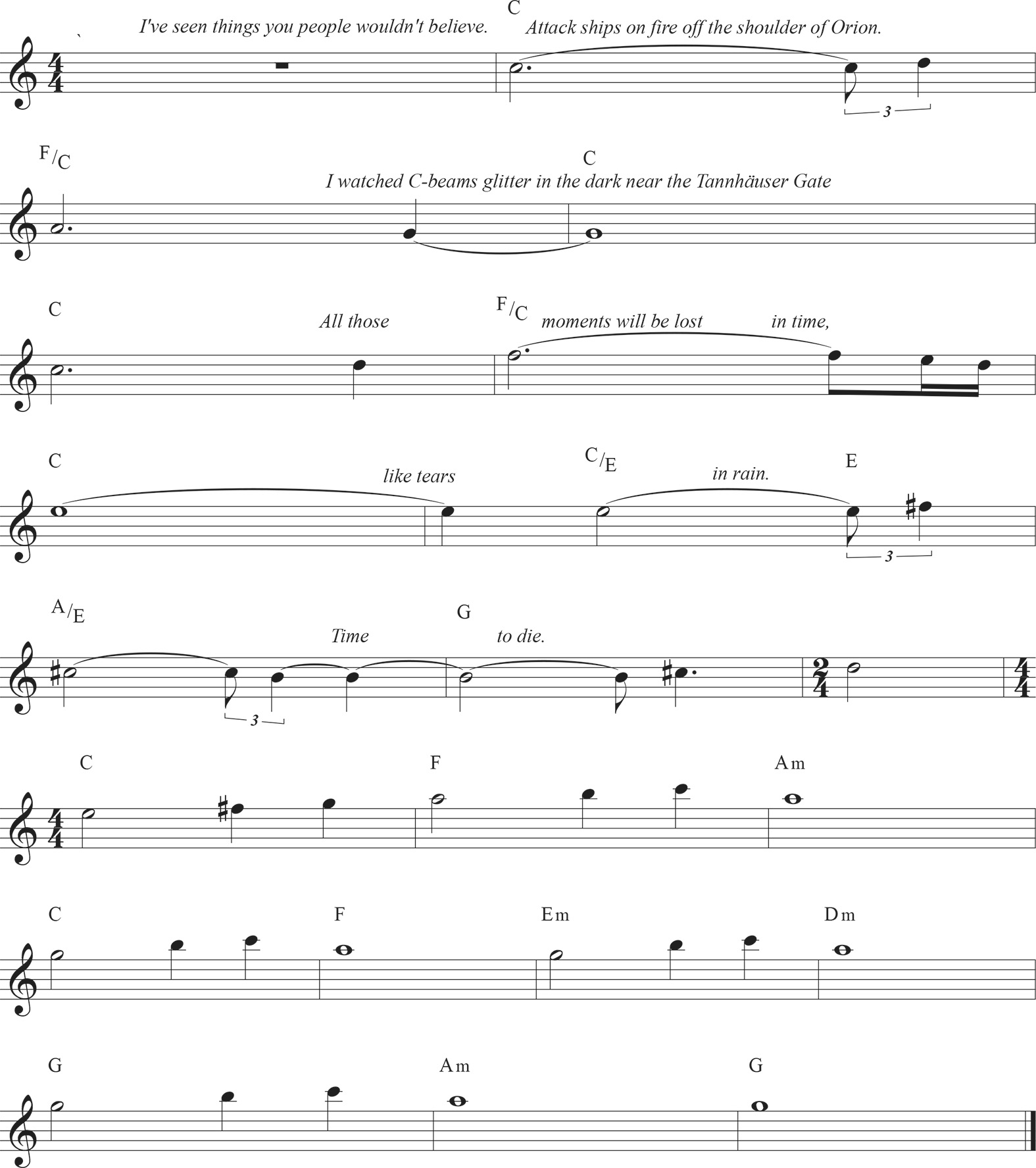In this blog post, I’ll be delving into the music that accompanies what I believe to be one of the most poignant moments in film history, especially within the realm of film scores. The iconic “Tears in Rain” monologue from Ridley Scott’s Blade Runner, as delivered by the late Rutger Hauer, is memorable not only for the breathtaking scene, exceptional acting, and poetic delivery but also for its remarkable score. Composed by Vangelis, the music, played on analog synthesizers, masterfully enhances the scene, adding layers of depth and meaning.
I have a special connection to this scene, as I recorded the piece with my chamber jazz trio, Malnoia, for our 2021 album “Hello Future”. This album was a conceptual project, blending music with short stories, science fiction, and philosophy (give it a listen here). It was the only cover song on the album and remains one of my favorite tracks.
Before we dive in, let’s have a look and listen at the original scene and score.
Tears in Rain - the scene
In this memorable scene, Rutger Hauer’s character, Roy Batty, a replicant (an artificial android being), reflects on his life and the remarkable experiences he’s had, moments before his death. Hauer significantly rewrote the script’s monologue, creating the version that has become widely celebrated.
Tears in Rain - the music
Below is a lead sheet of the score, with simple chords, the melody, and Roy Batty’s words:

I recommend watching the scene again but this time, follow along with the score, paying close attention to the harmonic and melodic developments underneath the monologue.
Roy Batty shares his extraordinary life experiences, things “you people wouldn’t believe”. As he approaches his concluding words, he says “All those moments will be lost in time, like tears in rain.” When he says the word “tears”, we are in the key of C major, but then the bass moves up to an E. Batty hasn’t finished his sentence yet, and there’s this moment of ambiguity: the harmony seems uncertain whether this E belongs to a C major chord, an E minor chord, or something entirely different. And then, upon saying “in rain”, the harmony changes, and it turns out we’re in a new key: E major, a bright, almost revelatory chord.
To me, the moment of harmonic ambiguity poses the question: what is he? Is Batty just a robot, composed of ones and zeros, purely mechanical? Or is there something that it’s like to be him, and does he have experiences that are valuable and meaningful?
When the music modulates to E major, I think what we’re being told is that he’s expressing something so poetic, conveying so much emotion, that there might be more to it than initially meets the eye. The shift in harmony subtly suggests that the entity we’re observing possesses a distinct and valuable life of its own.
This harmonic pivot isn’t just a musical technique; it’s a narrative device that aligns with the scene’s emotional depth. It suggests a richness to Batty’s internal life, challenging the audience to reconsider the nature of consciousness and the value of artificial life.
Malnoia's re-score
Given Malnoia’s fascination with Blade Runner and this particular scene, it was inevitable that we would record this composition. In the studio, we played along with the original scene and score, matching the timing and feel. The instrumentation could almost not be further removed from the original: the epic 80s synthesizers versus our acoustics and almost classical-sounding bass clarinet, viola, and piano. However, by having our violist Benni play these spacey arpeggios, Lucas covering the low bass notes, and myself playing sparse single-note melodies on the piano, I think we captured the atmosphere and meaning of the scene quite well. But give it a listen yourself, and let me know what you think in the comments below!
R.I.P. Rutger Hauer
In 2019, shortly after completing our album “Hello Future,” I reached out to Rutger Hauer’s manager, hoping to involve Hauer in narrating the album’s short stories for a 2020 live tour. While we were in the early stages of this conversation, Rutger Hauer passed away in July 2019, ironically the same year his character dies in “Blade Runner.” Soon after, the pandemic struck, erasing any possibility of the tour happening.
All these events highlighted how inherently unpredictable the future is, which in itself became a major theme for the album. In 2021, we released it in a six day online event, the Hello Future Experience, with short stories, interviews, performance videos, behind-the-scenes, and a live stream. However, we haven’t performed it in a live concert yet. That’s all to change, because I’m excited to announce that next week, March 29th, 2024, we’ll performing live for the first time in 5 years! Get your tickets here. We’ll be performing this scene, as well as other pieces of the album, and a brand new composition that I’m excited to premiere.
I hope to see you there!
Let me know what your thoughts on this musical analysis and the score in the comments below. As always, make sure to grab my free Reharmonization Quick Guide here to get you started on your own reharmonizations!

